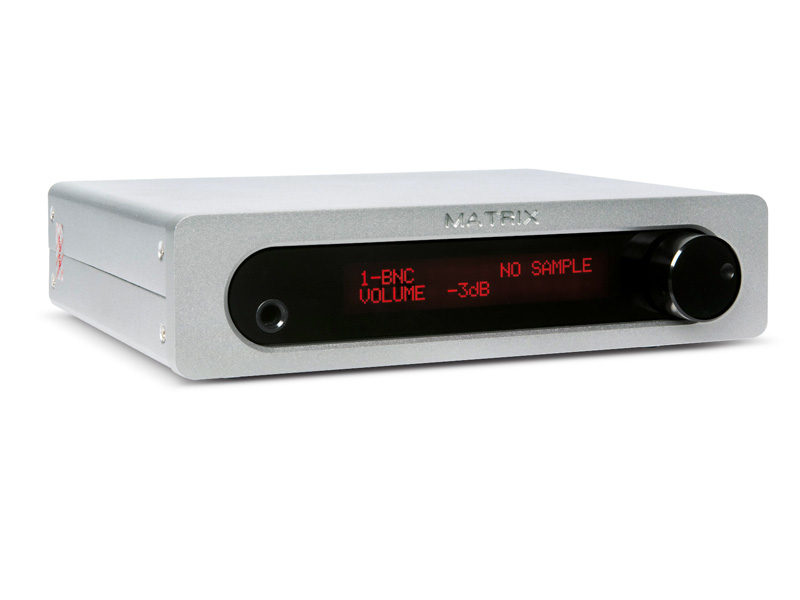TechRadar Verdict
Pros
- +
Agile, lively and detailed sound
- +
Clear and full-bodied bass
- +
Good audiophile features
Cons
- -
Slightly less impressive via USB than S/PDIF, though that's a high bar to reach!
Why you can trust TechRadar
Diminutive DACs are very much the flavour of the moment – just look at the widely varying models from Cambridge Audio, Arcam, Lavry, Benchmark and so on.
Many of these are aimed fair and square at the computer audio world, with hi-fi -flavour inputs (S/PDIF etc.) almost an afterthought and indeed the idea of adding quality to computer audio via a USB digital audio interface is thoroughly sensible. The Matrix Mini-i DAC is no different.
Not the same old
Except that in some ways it is. It takes audiophile details unusually seriously, with pro-style AES/EBU digital input and also balanced audio outputs alongside the usual phono sockets. It also features a headphone output and a volume control, operative on headphone and line outputs. And a digital output. And... (drum roll) a remote control!
This puts it in a class of about one: granted, a remote is not the most essential accessory for a DAC, but it has its uses and as such is astonishingly rare. It's a rather sexy metal remote control too, a very nice touch.
No sign of scrimping
If you use the 'traditional' digital inputs you can take advantage of the Mini-i's 24-bit/192kHz capability. Via USB it's limited to 48kHz sampling. The electrical S/PDIF input is on a BNC socket, while the output is on a phono – at least that reduces the chances of mixing them up.
Sign up for breaking news, reviews, opinion, top tech deals, and more.
Inside the case there's a generous helping of circuitry including a good quality modern DAC chip (in fact two of them) and decent op-amps. The mains transformer is internal so there's no 'wall wart' needed.
Operation is straightforward thanks to the informative display and intelligent push'n'twist control – twiddle for volume, press briefly to change input, press and hold to switch off.
There's quite a bit of circuitry inside the case, including two high-performance DAC chips (each capable of stereo operation, so presumably operating in tandem to lower noise and distortion). Op-amps are good parts too and in general there's no obvious sign of scrimping anywhere.
A spring in its step
We've had some impressive audiophile results from a few budget DACs recently, so our expectations of the Mini-i were high. For reasons of convenience as much as anything else, we began our listening with a CD player as source, connected via electrical S/PDIF and this turned out to give very good results.
What we most enjoyed about the sound was the light and agile character that this DAC seems to manage so well: it's not short of bass when needed, but it has great energy and clarity in the midrange and treble which can really make music skip along with joy and verve.
In prosaic technical terms, this is basically down to its good resolution and extended treble – possibly ever so slightly bright, but certainly not in a disturbing way.
We felt that USB sounds a touch less assured, with slightly less insight in the upper octaves and also a bass register that could use a touch more precision. This is being picky, though, and had the S/PDIF performance not provided such a classy comparison we would doubtless have been quite impressed by USB. There's no question, but that it will provide a clear and obvious upgrade over most onboard computer analogue outputs.
Great with 'phones too
The headphone output deserves special praise. It is capable of driving headphones loud very cleanly, but at any volume level there is a real sense of assurance that makes the whole experience very involving.
Headphones may not need as much hard driving as loudspeakers, but a good source like this makes one realise that a tight rein is still beneficial. Given that digital volume controls still have a dodgy reputation in some quarters, it's also worth mentioning that we were never aware of this one having any adverse effect.
Using it as an alternative to the traditional control on our day-to-day amp produced no audible side effects that we could hear. For ultimate sound quality with a USB source, this may not quite beat the Cambridge DacMagic, but it is certainly a very capable DAC and the flexibility of remote, headphone output and volume control make it exceptionally attractive value.
Follow TechRadar Reviews on Twitter: http://twitter.com/techradarreview
